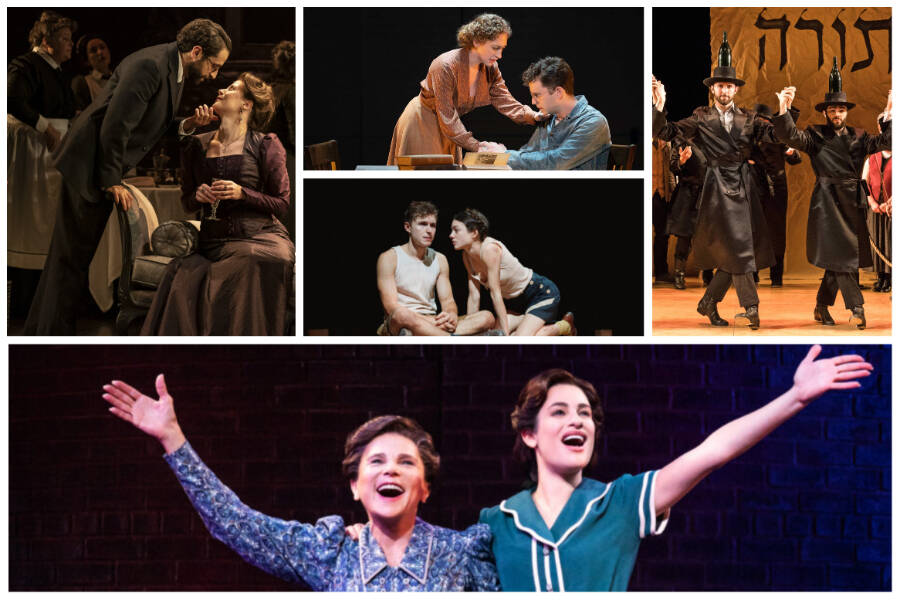A family saga spanning generations, an intimate two-hander set on Long Island, a long-awaited revival of an under-sung classic, and two reimaginations of classic American musicals—stylistically and aesthetically, Leopoldstadt, Camp Siegfried, Parade, the Yiddish Fiddler on the Roof, and Funny Girl have little in common. Except, of course, for all that they do. At a time of rising antisemitism and right-wing violence, each of these works examines the present moment’s roots in a not-so-distant past. Taken as a group, they speak to each other. With full credit to a creative-thinking press representative at Boneau/Bryan-Brown, American Theatre convened this conversation, bringing together a group of theatrical luminaries to discuss the shared language, fears, dreams, themes, and imaginations of their plays: Veteran actor Joel Grey, who directed the Yiddish Fiddler; Tovah Feldshuh, who stars at Rosie Brice in Funny Girl; Caissie Levy, who stars in Leopoldstadt; Michael Arden, who directed Parade at City Center; and Bess Wohl, who wrote Camp Siegfried. The conversation has been edited for concision and clarity, and also appears as an audio podcast here.
GABRIELLE HOYT: Theatre is often criticized for its inability to respond with immediacy to the present moment. That is not a problem for your shows, which run the gamut from stories of Jewish success to narratives of American Nazis to everything in between. What I want to do in this hour more than anything else is explore what your work means today, in November 2022, and what it means to contemporary audiences, and what it means to each of you. So actually, where I want to start this conversation—and again, see all the magical and creative ways that all of you take it—is by asking: What do each of the plays that you’re here to talk about today mean to you, personally? And how do their narratives intersect with your own?
JOEL GREY: Having the Ukraine circumstance as a background to this play today—as it turns out, we talk about Kyiv in Yiddish—and you know, it’s about that time when all of our relatives were living there and running away. And these people in Ukraine are still running away. And the fact that it’s happening in real time really sits on my head.
GABRIELLE: Thank you, Joel.
CAISSIE LEVY: When I first read Leopoldstadt and auditioned for it, I was struck by the themes of the play being as relevant today, the conversations between the family members of, “Are Jews safe? Where are we safe? Does Israel matter? Do we need a homeland of our own?” I have these debates with my husband every day. And this was before the headlines of the last month or so, which have just been so extraordinarily awful and scary. So, you know, l’dor v’dor, generation to generation, I think these are questions that Jews have been asking themselves since the beginning of time, and here we are again, asking them.
JOEL: The same questions. Right.
TOVAH FELDSHUH: I can jump in. I think that the Jewish people have the great advantage of the fear of extinction. I think it’s very important to stand up and tell the Jewish story. I also think it’s very interesting that in Funny Girl, I’m the first actress of the Jewish religion to play Rosie Brice. Interesting. So these Jews, talented Jews, wrote this Jewish story. And Rosie Brice—Rosia Borach—owned four saloons in Manhattan. They saw the word “saloon” and guess who got those parts? Irish Catholic actresses. For decades. So after this latest rendition with the wonderful Beanie Feldstein and Jane Lynch, one of the producers who happens to be of a Jewish background—actually, two of them—thought, “Oh, why don’t we cast a Jew in this part, you know?” So they did. And it worked. And my job is to make this Rosie Brice particularly Jewish. Not particularly American. That is one of the joys of doing Funny Girl. Now, Harvey [Fierstein] has rewritten some of the script, and it says, “Mazel Tov, Fanny” on Henry Street. And I asked to call Fannie “Fannele” and they said yes. I asked to put in “oy yoy yoy,” and we finally got the “toi toi toi” right. Because it’s in my heritage—certainly it’s in Joel’s and my heritage.
MICHAEL ARDEN: I can speak about Parade a little bit. You know, this is a musical that I think many people have known for a while, but not seen in a long time.
JOEL: I was there opening night at the Lincoln Center!
MICHAEL: Wow! Interestingly enough, it didn’t get quite the life it deserved originally. I think it was playing in the Clinton years, when we thought that we sort of had everything behind us: that we had figured out racism, that we had sort of decided that antisemitism was a thing that died, really during the Cold War. And so, it felt like a bit more of historical fiction. And, here we were rehearsing in City Center—a 10-day rehearsal process—and on day three, people were doing Nazi salutes over the 405. And so that was what it felt like day by day. We began to understand the work that we were doing, the story that we were telling, which is ultimately about how people’s traumas, un-dealt with over time, become hatred, reciprocal retribution, and become—they try to inflict trauma upon others, because they believe that there is not enough in the world. They believe that the success of someone else, that someone else is getting something, means that they are losing something. So this became more and more prescient every day.
So it was fascinating to get to work on this show right now. And I think we began to see while we were working on it day by day that what we were doing was—is, actually—really, really, really important. And to be able to look at something that really happened, this true story of Leo Frank and his lynching, and then look at it through the sort of post—not post, but since the Black Lives Matter movement has begun—to look at how racism and antisemitism are the same thing. It is all about white supremacy and how that has infiltrated the judicial system, our political system, our schooling, how we are educated. And so entering into it, we wanted to tell a piece of historical trauma, and it became something much more relevant. That was fascinating, upsetting, but thank God we had a chance to tell that story every night last week.
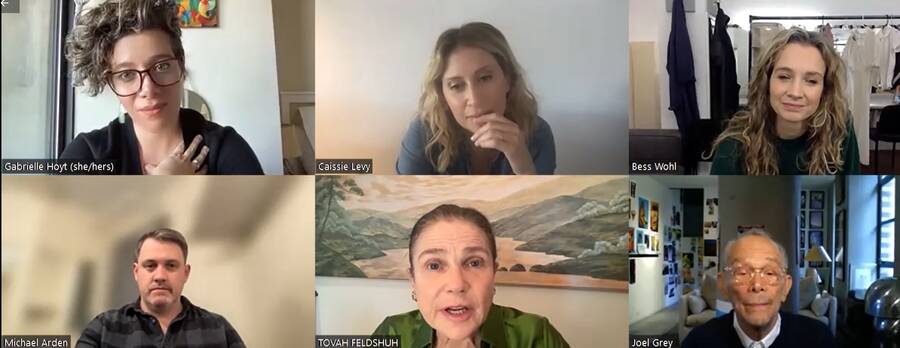
BESS WOHL: It’s really interesting hearing everyone talk because it is just resonating so much with everything that’s in my brain right now—the terror of history repeating itself and and how can you learn from what we’ve been through, and hopefully, live with more awareness and action and all the things that we’re striving for. My play is also historical, and it takes place in 1938 on Long Island, and it sort of came from—I wrote it in the summer of 2020 during the reelection campaign of Donald Trump, and the setting for the play is a real summer camp on Long Island that was called Camp Siegfried, that was run by the German American Bund in the late 1930s. And basically it was a way of indoctrinating kids into Nazi ideology. The photographs and the footage from the Long Island Camp Siegfried look like it’s straight out of Nazi Germany. Swastikas everywhere. You can’t believe—I mean, when I first encountered this story, I couldn’t believe that this had happened in America. So I thought a lot about how reluctant we are to look at our own darkness, the darker parts of our history, and how important it is to look at them and understand them. I felt really personally connected to it in a lot of ways. The morning after the election of Donald Trump, our neighborhood playground where my kids play was graffitied with swastikas. The morning after. And so I felt this sense that this was really encroaching, and I wanted to look at how these movements happen, especially in America, and I wanted to tell a piece of history, but also do something more in terms of looking at what happens in the human psyche that allows these things to grow, and what happens in our communities that allows these things to grow. And really try to understand something about this sense of mass delusion that can come over people, and try to create something that can wake people up from that, or that can at least let us think about it differently. So that’s where I am right now.
TOVAH: Maybe it sits in the belly of man. I was with His Eminence Cardinal O’Connor, and I said, “You know, I’m just a Jew, but do you really believe in the devil?” He said, “Absolutely, Miss Feldshuh. He sits in the belly of man.”
GABRIELLE: To me, the thing that binds all these plays together is their interest in an imagined historical past. Everything from the fables of Sholem Aleichem to Tom Stoppard’s own exploration of family history through Leopoldstadt, to Jason Robert Brown’s musicalization of the lynching of Leo Frank. So I’m really interested in what the past is saying to us in the present, and also what it is asking of us to imagine for the future. Joel, I would love to begin by asking that of you—especially given Fiddler‘s beautiful translation of an American musical into Yiddish—how that act of translation and that depiction of an imagined past is speaking to who we are now.
JOEL: I don’t speak Yiddish. So when I took the job, I had to say that, and we had to rehearse it in English first, and then put in the Yiddish. And there were a lot of young people in the play who are not Jewish, who never heard of it, didn’t know anything about it, and became absolutely fascinated and committed to learning this difficult language. And getting onstage and seeing the effect of Yiddish on audiences, non-Jewish audiences, hearing this language that they thought maybe was dark, negative, “the enemy.” Antisemitism, I mean, it sits in our theatre, because people don’t even know that they’re antisemitic, until they do. And this play brings that all up. As with all of these—this is a great idea for you to put together these particular plays to talk about.
GABRIELLE: Michael, I wonder if I could throw this to you also, because of the very different perception of Parade now versus when it came out, and ask a similar question: What is the retelling and retelling of this story doing for us now, in 2022, that perhaps, it was telling all along but we’re hearing differently now?
MICHAEL: Yeah, I think retelling is the only way we remember. It’s the only way we are forced to reexamine something from the different vantage points of our own age and experience. For instance, when I first read or knew Parade as a college student, I went to Lincoln Center and watched the capture, and, you know, it means so much more to me now. It actually is an entirely different story to me now. I thought, “Oh, this is a love story about two people, you know, against all odds.” And sure, that’s part of it, but to me now, seeing it based on experience, both mine and my experience of the world, that changes. So if we only tell a story once, how do we learn from it? How can we learn the full possibility and capability of the material? We’re not actually seeing the full story unless we revisit and revisit. It’s why we revisit Shakespeare. It’s why we celebrate holidays. I’m not a Jewish person, so I look and I see we celebrate freaking Easter every year. What is that about? Why do we need to do that? It’s actually about stories. We need to revisit stories at different points in our life so that more of the essence and truth and reason for remembrance appears as we grow. So that’s what it felt like to me: the idea of never forgetting. In order to never forget, you have to continue to tell, learn the story over and over again.
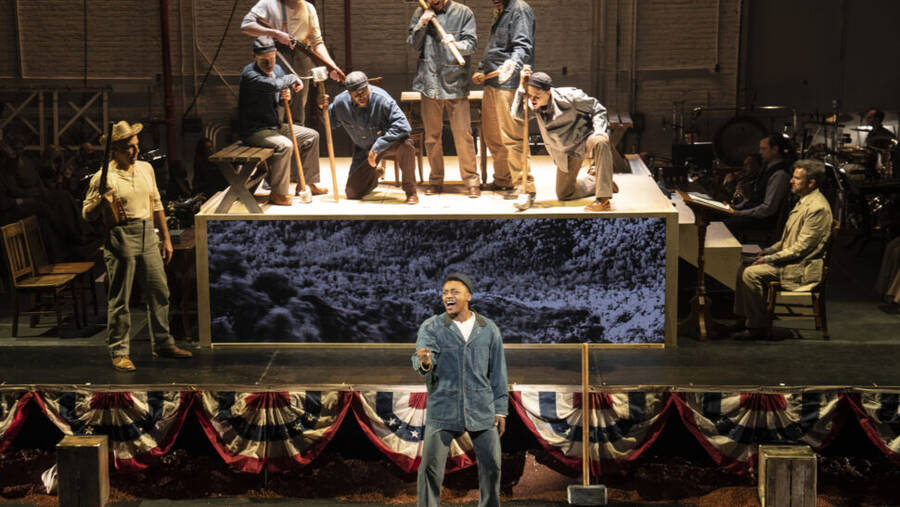
CAISSIE: I love, Michael, what you just said. I was thinking about Passover, and that this is what we do on Passover—we sit around a table with our people and some invited guests, whom we are commanded to bring into our Seder table, and we retell the story of our Exodus from Egypt and when we were enslaved. And the reason we tell it is so that we don’t forget. It’s the same reason we make theatre; it’s the same reason we revive shows, and we examine them differently when they are revived, to try to make them more relevant to what we’re living through now. So I think it’s very tied together—these pieces are all very much…it’s not an accident that they’re all being performed right now. I think people are craving examination of our world. I think Jewish people are really examining their relationship to their Judaism. Jewish Americans, right now, what does that mean? It can mean a million different things, and Lord knows it does. Especially Jews, we love to disagree about our faith and our religion. I always describe Judaism as a Choose Your Own Adventure book. Because everybody really comes at it from a different angle. But what binds us is: We’re Jews. And we are wandering. And we have been from the beginning of time.
Our stories matter, and I think we’re claiming them in a way. I see Broadway, specifically Broadway and Off-Broadway, claiming these stories in a way that five, 10 years ago, we weren’t. The representation onstage—the fact that more Jews are playing Jews, as Tovah mentioned, that’s not an accident. That’s something that people are asking themselves, Hmm, why hasn’t this been the case before? Why is it important for other minority groups and yet not for Jews? So now we’re starting to ask those tough questions, have those tough discussions with Jews and non-Jews alike, and looking at those inherited, inherent biases and feelings about our own culture and religion and faith and ethnicity. And that’s what theatre is for.
MICHAEL: It’s so funny. In Parade, Jason [Robert Brown] said, this is the first time there have ever been Jewish people playing Leo and Lucille Frank in a major production, which is crazy to me.
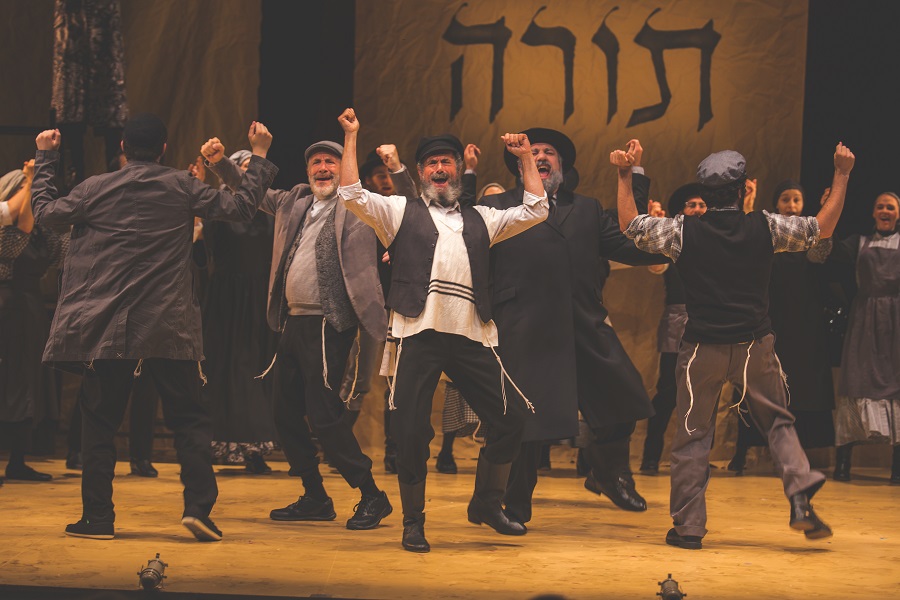
GABRIELLE: Joel, before we lose you, I would love to hear—I’m sure we all would—about revisiting Fiddler, now, this year. What new things has it said to you? What has surprised you? What have you seen in it that you didn’t even a few years ago, when you staged it brilliantly for the first time?
JOEL: I always thought of it as more Chekhovian than Broadway—that these people were from a very specific shtetl, and they talk to each other. And the style of musical, when Fiddler came out, was very radical in a way. But very, very general, and not specifically Jewish. I don’t think they dealt with the background, except that the depth of Jerry Robbins’ Yiddishkeit that he had inside of him, whether he liked it or not, came out. And he knew it. It was in his bones. And it’s in my bones. And I’m going to put it in the cast’s bones, because we have a lot of non-Jews acting in this, and they’re just wonderful in their willingness to join me in being Jewish for a couple of hours, and being proud of it and connected to it. So it’s really interesting, because there are a lot of people who don’t speak the language, who don’t look at the translation, they’re just into the characters, and they know what they’re saying. And that was my joy, to introduce them to being Jews.
At this point Joel Grey had to leave the conversation, which continued with the remaining folks.
GABRIELLE: Antisemitism is a societal problem, right? It is a symptom of decline or even collapse at times of instability. Whether it is the American South in Parade or Vienna and Western Europe trying to find a purpose after World War I, that’s when it comes up. And it’s a societal problem. It’s everyone’s problem. But so often it gets framed as a Jewish problem, a problem for Jews, that only Jews should really care about. I think something that each of your plays does so beautifully is it invites an entire audience, not just Jewish members of an audience, to consider how antisemitism is a problem for all of us. And I would love to discuss how you feel like each of your plays is doing so. Bess, I would love to start with you on this, because of the plays that we’re talking about today, yours is the one that doesn’t depict Jewish characters. And those characters are very insulated and naïve in some ways, and very knowing and culpable in other ways. I’m wondering how you are inviting in a whole audience—every member of an audience who sees your play at Second Stage—to think about this problem as our problem, and an American problem, specifically.
BESS: Yeah, honestly, it was very scary for me to start to think about these characters. It’s a 16-year-old girl, it’s a 17-year-old boy, they’ve been sent to be indoctrinated in this camp, a Nazi summer camp, that looks idyllic on the surface and is incredibly, devastatingly evil in the underbelly, and deeply antisemitic. And I spent a lot of time thinking, What am I asking of an audience, in terms of introducing them to these characters? And how do I want people to be thinking of them? And how am I thinking of them? And what is the reason for introducing people to these particular characters? All of that was deeply on my mind. Also, given their age, how can we think of the equation of responsibility for both of these people and not shy away from it, but also not put things on them that they don’t know yet? It’s a very thorny and complicated space to navigate. I think that’s part of why I was interested in trying to figure it out. Ultimately, for me, the question of how we get seduced as a community and as a society into, in the case of my play, fascistic, really violent, terrible ideologies, is part of what I’m trying to track with these characters. When you meet them, how are they seduced? How are we seduced by them? What are the moments when we forget, and they just seem like these really nice kids? And then you bring grim reality back in. Calculating all of that in this package of a play, which is an instrument of seduction already, and is drawing you in and asking you to forget things and telling you a story. All of that was part of why I was interested in trying to unpack this and look at it. Because I think these movements don’t start with where they end. They start with, “Doesn’t it feel good to be part of a community? Doesn’t it feel good to stand up for your country? Don’t you want to?” And they sort of build people up in this way. And then before you know it, you’ve fallen into something really terrible. So I think that I was interested in that—in trying to figure that journey out, as scary and upsetting and horrifying and dangerous as it feels every night.
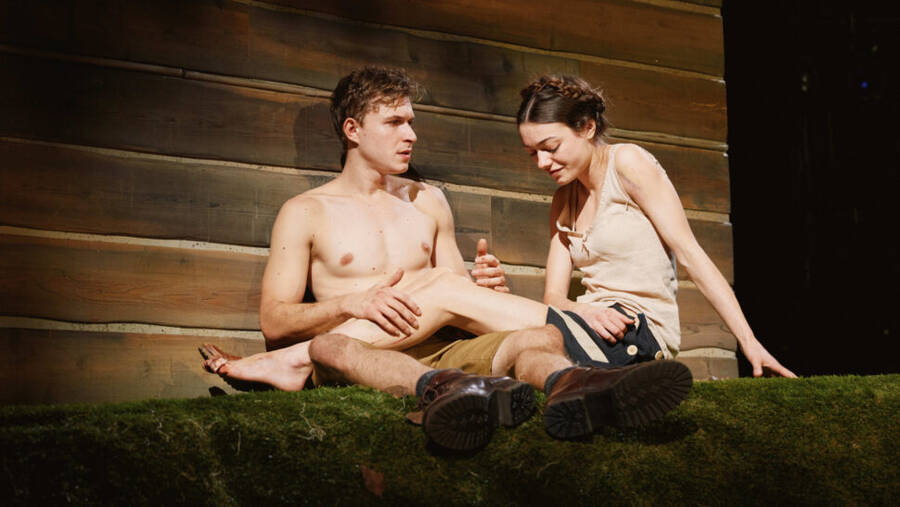
GABRIELLE: Caissie, I’d love to talk to you about this question, specifically because Leopoldstadt is, in many ways, such a European play. It’s set in Vienna; it originally premiered in the U.K. and won the Olivier. I’m specifically interested in your experience as a performer, how you’re reaching across those multiple cultural gaps, and also gaps in time in order to, again, make this bigger than one family’s story.
CAISSIE: Yeah, absolutely. Well, as Bess said, it’s so interesting that we don’t end where we start: that the fright of antisemitism, and its rise, every time it swells in our communities, is down to many, many factors that sort of creep slowly. And what I think is really interesting about how Tom has structured Leopoldstadt is that we meet this family, this extended family, when things were good—when they were Jewish without being “offensive,” when they were in the community-ish, sort of assimilated. And we see as time goes on how they are pushed further and further away from society and demonized and scapegoated and all of that. But I know as a Jew growing up, I felt like I had a lot of Holocaust education, but not a lot of education about prior. That was really interesting, working on this play, doing all the research, doing all the reading, just getting in touch with these thriving communities that existed in Europe before the Holocaust. I think that’s what is hitting people like a ton of bricks at our show, because they’ve heard that there’s Holocaust elements of this play, but the play opens with a really lively, happy Jewish family bantering and arguing and discussing with a Christmas tree onstage. In Vienna. Like, What is this? Did we buy the right tickets?
GABRIELLE: Michael, I’m curious, because from what I’ve read—I sadly was not able to see the very short City Center production’s run—but you incorporated in your direction elements that were not in the time period, am I right? That were calling out to different moments in time?
MICHAEL: I mean, I used a lot of historical photography. It was really important to me that, when we met a character, we saw a photo of that real person, so we really understood that this person really existed, that they walked the earth like we do. I really wanted to engage the audience on a more active level, so seeing photos of these people while looking at actors onstage—you’re seeing Lucille and Leo Frank’s pictures, but then looking at Micaela Diamond and Ben Platt, and understanding they are playing these people. So in a Brechtian Verfremdungseffekt-like way, we weren’t just on an emotional ride, we were, as an audience, engaged as critical thinkers at the same time. That was something that was really important to me. And there were some modern elements bookending it. That was important to me. I flew down the week before rehearsal to Marietta and drove out to the lynching site, and took projection photography for the production and did video for it. It was important to me to be reminded of what that place looks like now: It’s now a Waffle House. There’s a Chick-fil-A there, it’s on the side of a highway. And ultimately he is indeed forgotten in many ways. This story has been forgotten, as have the uncountable lynchings that occurred post-Civil War to now. And in a way, lynchings are still occurring, they’re just in different forms; people happen to wear badges and shoot people in the back. This thing is still happening. And it was important for me to remind the audience that yeah, if this tiny little landmark on the side of the highway that no one knows is there is so easily forgotten so quickly, it can happen again. It was important to me to really make it about now, and show that this cycle is ever continuing. I think Aeschylus was trying to point this out: When do we stop? When do we stop saying, “I am hurting, therefore I need someone else to hurt more than me so I feel happier”? I think that’s what this play is about. When people don’t have a way to deal or articulate their trauma like this, horrible things can occur.
And may I say one more thing? In Parade, everyone is a victim. The Black characters are victims. Leo’s a victim. Lucille’s a victim, Mary Phagan is certainly a victim. We are all dealing with this, with the reverberation of this, and I think if we begin to understand that what ties us together is, in a way, that we are all dealing with this, then the divides might seem less wide between certain groups.
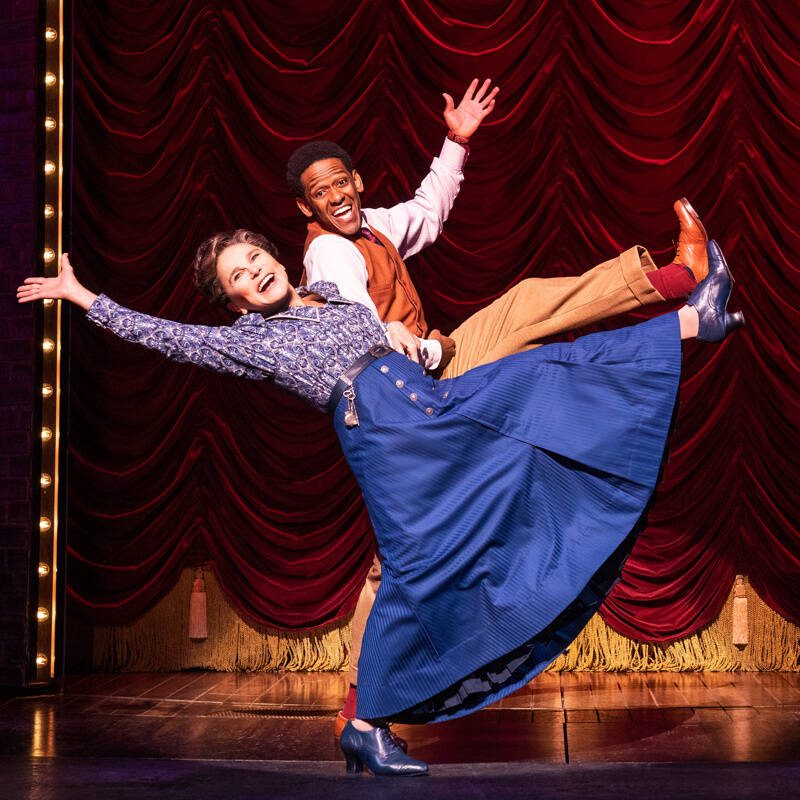
GABRIELLE: Something that is so striking, just listening to all of you talk, is this sense of almost a moral imperative. It sounds like each of you have experienced, working on these plays, moments of understanding that there was a sense of ethical or moral purpose driving you forward. Tovah, I would love to begin with you. I’m so glad that Funny Girl is a part of this conversation, because Funny Girl is so much about Jewish joy and Jewish success in America—such a beautiful story to be telling onstage. I would love to hear from you about that question of whether you as an actor, as a person or as a Jewish person, feel that you have some kind of moral or ethical imperative to be playing this part?
TOVAH: Well, I was lucky. I was born Terri Sue Feldshuh in an undisclosed decade, and I changed my name to Tovah—it’s actually in this memoir that was published by Hachette last year called Lillyville: Mother, Daughter, and Other Roles I’ve Played. I fell in love with a boy at Wesleyan named Michael Fairchild, and he didn’t like the name Terry Sue, he said, “What kind of a name is Terry Sue for a girl like you’re? You’re from the North. What else were you called?” And I said, “I was called Tovah in Sunday school.” I did not say Hebrew school, but it was Hebrew school—it was part of the conservative movement, Tuesdays and Thursdays, from 4 to 6 and Sundays from 9 to 1, and I was the only bat mitzvah at Quaker Ridge School. But I had a father who was a G.I. and he was in intelligence, and General Eisenhower chose Jewish boys who were fluent in German, and he let those Jewish boys interrogate the SS and the Wehrmacht to decide who went to Nuremberg. My father got home in ’46, I was not yet born, but by the time I was a little girl, he always used to say, “Be proud of being Jewish and have joy in it, because you will be reminded anyway.” Anyway, by changing my name to Tovah Feldshuh my perceived value changed, and the landscape of my entire artistic life changed. I started to inherit roles of great Jewish heroines, whether it’s gentle RBG, Ruth Westheimer, Golda Meir.
And Rosie Brice. It was a very big thing to make sure that my child was the seed, that I was the harbor, I was the belly from which she came. I was the first person of dream and vision that Fanny Brice would then fulfill, which is any immigrant dream. Also, we got lucky because it’s an American story, in the sense that Lea Michele has been playing Fanny Brice and marinating that part for 18 years, so she was ready to rock and roll. She was the first person who could take that mantle from Streisand, create her own Fanny Brice with her enormous talent, and tell this Jewish story with pride. Because it lurks—Streisand is lurking in the background. I saw her when I was 13 years old. I actually I wrote her, “Dear Barbra, I’m finally playing your mother, love, Tovah.” And she wrote me back!
And I’ll say it right out to Kanye West, and this fabulous person, Mr. Irving—I think it’s very important to speak out and to stand up and to say, “Look who flanked Martin Luther King and the Civil Rights Movement. Keep your eyes 20/20, please.” It’s fascinating to me. I’ve never experienced anything like this in my life, and I’ve had seven decades on this planet. I have never experienced antisemitism so overt and controversial as it is now. And I don’t get it, because if they come after us, who do you think they’re going to go after next? Come on.

GABRIELLE: Thank you. I want to pick up on something you said about Leopoldstadt and throw this to you, Caissie, which is that I think like one of the most beautiful parts of that play is how much time it spends, as you were saying, in the family unit, in Jewish joy and relationships and ritual as well; we get that Seder halfway through the play. I’d love to ask again this question of morality and ethics and theatre, but specifically about you getting to portray not just Jewish suffering but also Jewish joy, your ritual connection to family and how that has been for you as a performer.
CAISSIE: It’s been really, really special. I was the girl that in the early parts of my career could never get an audition for Fiddler; I’d never played any Jewish roles until recently, really till COVID hit, and then I was in Caroline, or Change, which was a very Jewish show. It was new territory for me. And then I went straight to The Bedwetter Off-Broadway, which was another Jewish role, not really to do with anything religious, more just cultural. And now Leopoldstadt. It’s been really wild, actually, for me to investigate, what does that mean to me onstage—this huge part of who I am and who I’ve always been now showing up in my art in a way that it never had? I find it I find it really moving. You know, on Broadway and Off-Broadway, we do shows on all the major Jewish holidays, but of course not on Christmas or New Year’s Eve, and I will forever be irritated by that. But especially with Leopoldstadt. We had shows on Rosh Hashanah and Yom Kippur, and it felt very wrong. More than on Caroline, or Change, more than on any show I’ve ever done. I was really grappling with it. We had just started previews, and so I understood that the way the calendar fell, there was probably no way around it. It was interesting, because I thought, well, no Jews are going to come see this show on Yom Kippur. Then I got a bunch of texts from people who were like, “Oh, I just broke the fast and I’m here at the show.” And I realized that it was a way for certain Jews to express their Judaism or to feel connected to their Judaism. So I felt a certain amount of pride in working on that day. You know, I’m not religious, but I just felt like this show and the subject matter maybe warranted a cancellation or reschedule on those holidays. But in the end, it ended up being quite meaningful to perform this Jewish piece on the most important date on our calendar—to remember these people that were lost, and invest all this time in this family and care about them and know them as people, and then we end, you know, with the loss of the generations of this family.
I find it really moving every night, and I find it really challenging. Some nights I’m really affected by the piece and being a Jew and being an actor in this piece. Other nights, I think I kind of hold it at arm’s length, just sort of as a survival mechanism. Especially, as Tovah was saying, with what’s going on in our country and in our world right now, and this really frightening uptick in antisemitism, I feel it’s more important than ever to be telling this story. And I feel really privileged that I get to be part of it and honor the people that came before me. I think it’s what a lot of art, the purpose of making theater, is about. It’s about remembering the people that came before us and honoring their legacies. I feel that I’m able to do that in this piece. And that hopefully will send people out of the theatre at the end of the night asking questions about their own families, whether they’re Jews or otherwise. It’s about remembering the people that came before you, doing better than the last generation, having tough conversations, standing up for what’s right, being an active participant in the world, and standing up for people who are your people, and people who aren’t, and doing the right thing so that history doesn’t repeat itself. That’s my main takeaway. You know, it’s great to do a really fun Broadway musical, but it’s really wonderful to do a piece that you think is truly touching people and sending them out into the world with an idea about how they want to change their lives.
Gabrielle Hoyt is a dramaturg, writer, and director. She is pursuing her MFA at Yale. @gabhoyt

